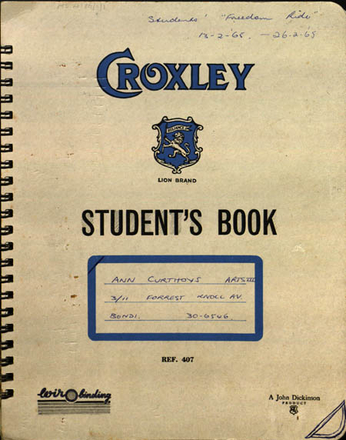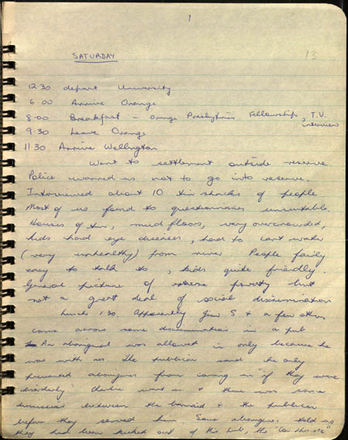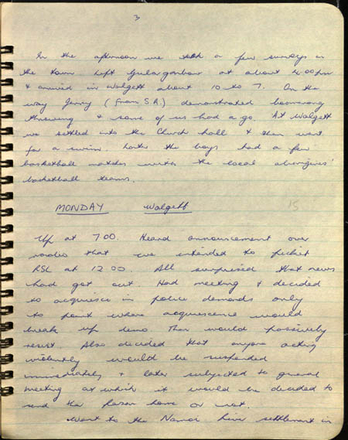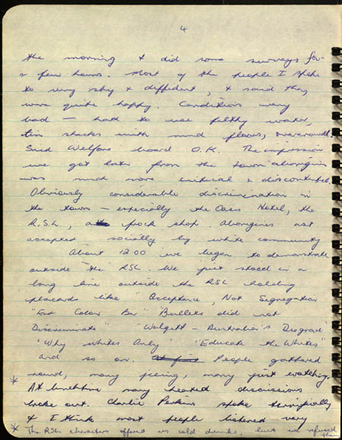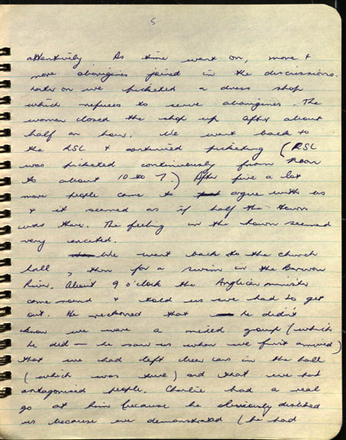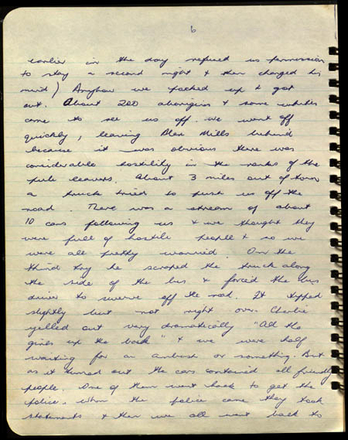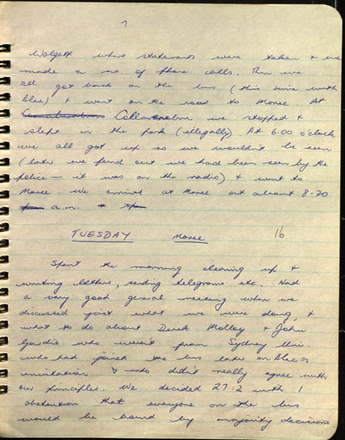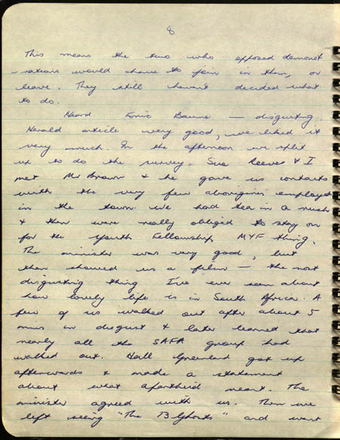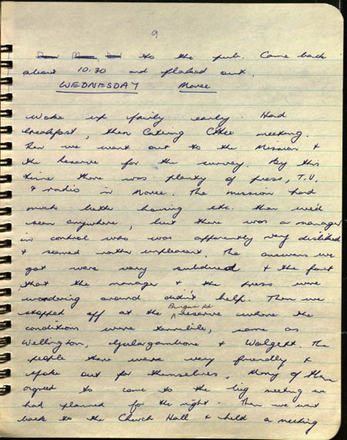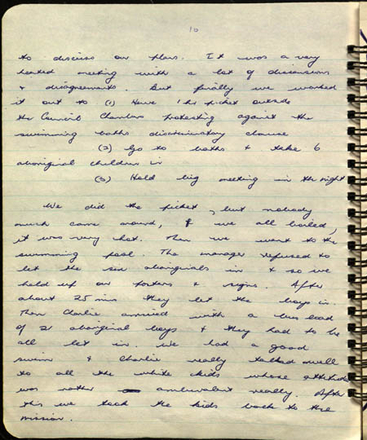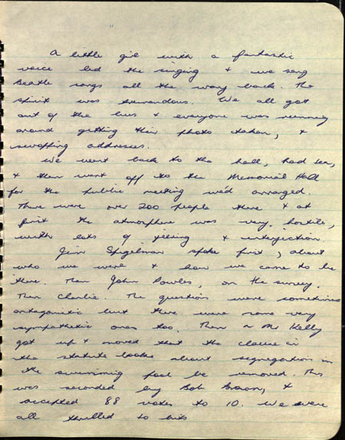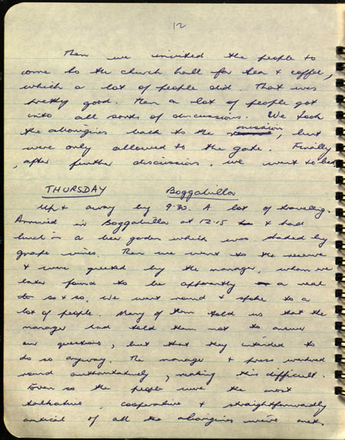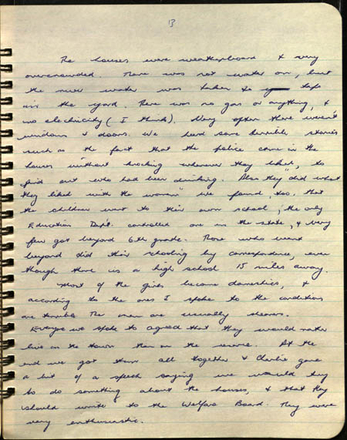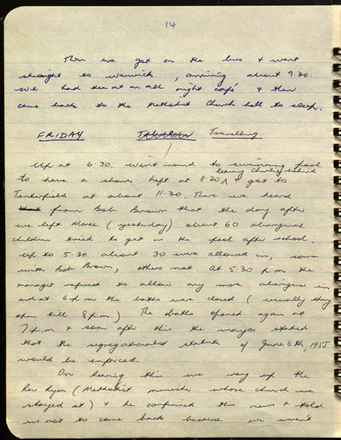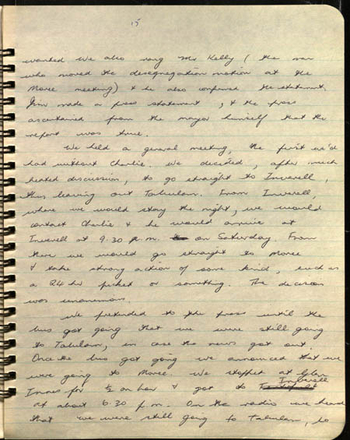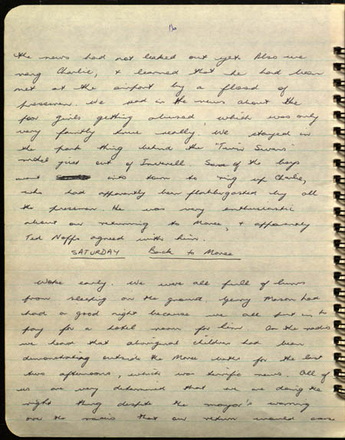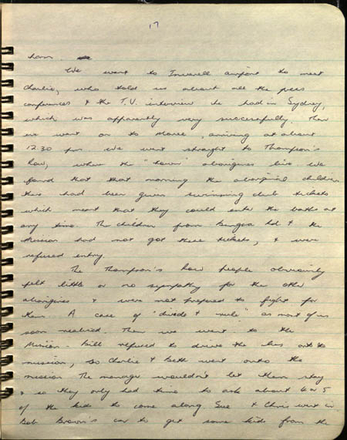Ann Curthoys' diaries have become an essential piece of historical material that tells the story of the 1965 Freedom Ride. Members of the Student Action for Aborigines (SAFA) organisation also produced many useful items that provide insight into this watershed moment in Australian history.
Aboriginal and Torres Strait Islander people should be aware that the Freedom Ride documents include names and images of deceased people in photographs and in print.
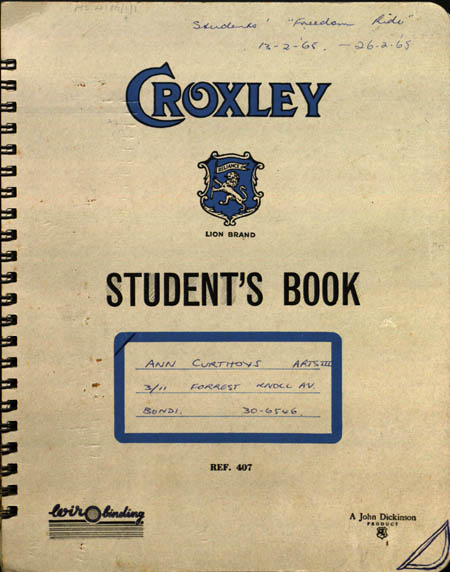
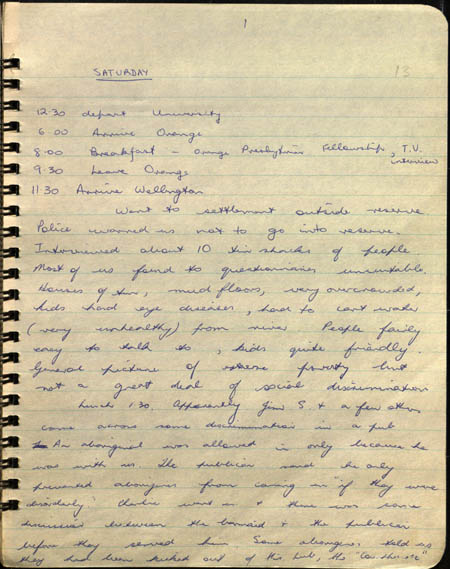
Saturday
12.30 Depart University
6.00 Arrive Orange
8.00 Breakfast – Orange Presbyterian Fellowship, TV interview
9.30 Leave Orange
12.30 Arrive Wellington
Went to settlement outside reserve. Police warned us not to go into reserve. Interviewed about ten tin shacks of people. Most of us found the questionnaires unsuitable. Houses of tin, mud floors, very overcrowded, kids had eye diseases, had to cart water (very unhealthy) from river. People fairly easy to talk to, kids quite friendly. General picture of extreme poverty but not a great deal of social discrimination.
Lunch 1.30. Apparently Jim S and a few others came across some discrimination in a pub. An aboriginal was allowed in only because he was with us. The publican said he only prevented aborigines from coming in "if they were disorderly". Charlie went in and there was some discussion between the barmaid and the publican before they served him. Some aborigines told us they had been kicked out of this pub, the "Courthouse".
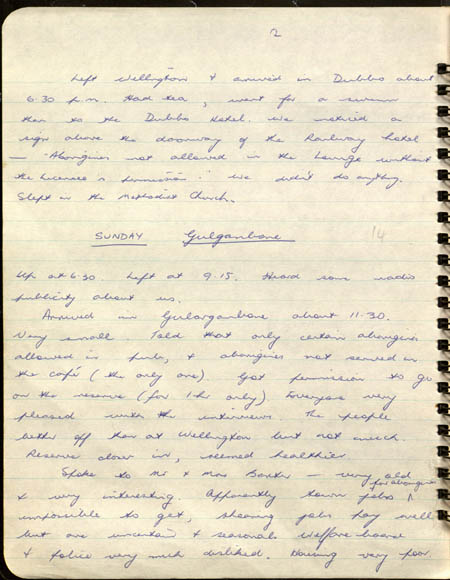
Left Wellington and arrived in Dubbo about 6.30 pm. Had tea, went for a swim, then to the Dubbo hotel. We noticed a sign above the doorway of the halfway hotel - "Aborigines not allowed in the Lounge without the Licensee's permission". We didn't do anything. Slept in the Methodist Church.
Sunday Gulargambone.
Up at 6.30. Left at 9.15. Heard some radio publicity about us. Arrived in Gulargambone about 11.30. Very small. Told that only certain aborigines allowed in pub, and aborigines not served in the cafe (the only one). Got permission to go on the reserve (for 1 hour only), Everyone very pleased with the interviews. The people better off than at Wellington, but not much. Reserve closer in, seemed healthier. Spoke to Mr and Mrs Baxter - very old and very interesting. Apparently town jobs for aborigines impossible to get, shearing jobs pay well but are uncertain and seasonal. Welfare board and police very much disliked. Housing very poor.
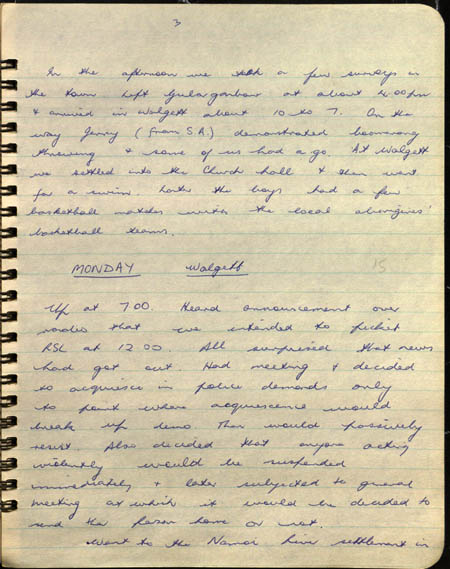
In the afternoon we took a few surveys in the town. Left Gulargambone at about 4 pm and arrived in Walgett about 10 to 7. On the way Jerry (from S.A.) demonstrated boomerang throwing and some of us had a go. At Walgett we settled into the Church hall and then went for a swim. Later the boys had a few basketball matches with the local aborigines' basketball teams.
Monday Walgett
Up at 7.00. Heard announcement over radio that we intended to picket RSL at 12.00. All surprised that news had got out. Had meeting and decided to acquiesce in police demands only to point where acquiescence would break up demo. Then would passively resist. Also decided that anyone acting violently would be suspended immediately, and later subjected to general meeting at which it would be decided to send the person home or not. Went to the Namoi River settlement in
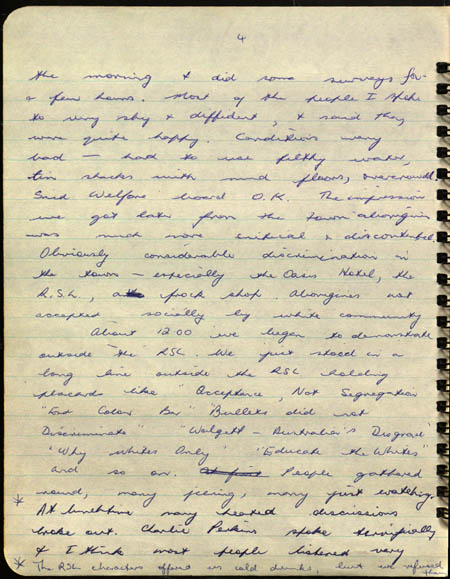
the morning and did some surveys for a few hours. Most of the people I spoke to very shy and diffident, and said they were quite happy. Conditions very bad - had to use filthy water, tin shacks with mud floors, overcrowded. Said Welfare board OK. The impression we got later from the town aborigines was much more critical and discontented. Obviously considerable discrimination in the town - especially the Oasis Hotel, the RSL, a frock shop. Aborigines not accepted socially by white community. About 12.00 we began to demonstrate outside the RSL. We just stood in a long line outside the RSL holding placards like "Acceptance, Not Segregation" "End Colour Bar" "Bullets did not Discriminate" "Walgett - Australia's Disgrace" "Why Whites Only" "Educate the Whites" and so on. People gathered round, many jeering, many just watching. The RSL characters offered us cold drinks, but we refused them. At lunchtime many heated discussions broke out. Charlie Perkins spoke terrifically and I think most people listened very...

...attentively. As time went on, more and more aborigines joined in the discussions. Later on we picketed a dress shop which refuses to serve aborigines. The women closed the shop up after about half an hour. We went back to the RSL and continued picketing (RSL was picketed continuously from noon to about 10 to 7). After five a lot more people came to argue with us and it seemed as if half the town was there. The feeling in the town seemed very excited. We went back to the church hall, then for a swim in the Barwon River. About 9 o'clock the Anglican minister came round and told us we had to get out. He reckoned that he didn't know we were a mixed group (which he did he saw us when we first arrived), that we had left beer cans in the hall (which was true) and that we had antagonised people. Charlie had a real go at him because he obviously disliked us because we demonstrated (he had...
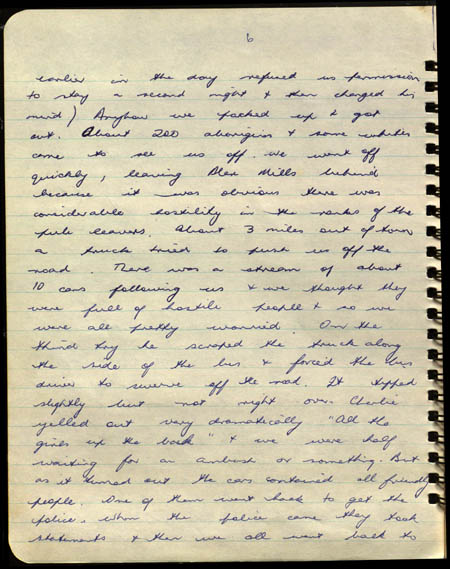
earlier in the day refused us permission to stay a second night and then changed his mind). Anyhow we packed up and got out.
About 200 aborigines and some whites came to see us off. We went off quickly, leaving Alex Mills behind because it was obvious there was considerable hostility in the ranks of the pub leavers. About 3 miles out of town a truck tried to push us off the road. There was a stream of about 10 cars following us and we thought they were full of hostile people and so we were all pretty worried. On the third try he scraped the truck along the side of the bus and forced the bus driver to swerve off the road. It tipped slightly but not right over. Charlie yelled out very dramatically "All the girls up the back" and we were half waiting for an ambush or something. But as it turned out the cars contained all friendly people. One of them went back to get the police. When the police came they took statements and then we all went back to
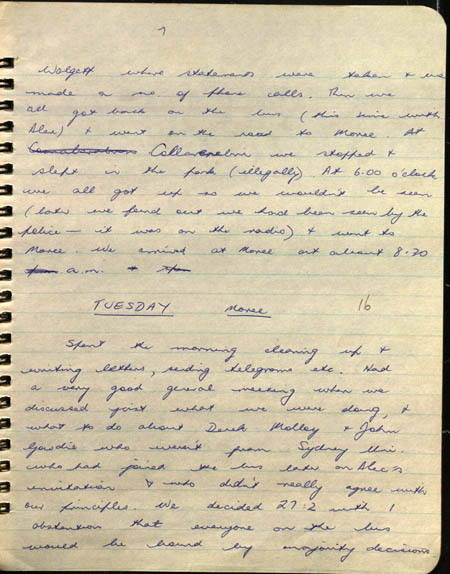
Walgett where statements were taken and we made a number of phone calls. Then we all got back on the bus (this time with Alex) and went on the road to Moree.
At Collarenabri we stopped and slept in the park (illegally). At 6.00 o'clock we all got up so we wouldn't be seen (later we found out we had been seen by the police - it was on the radio) and went to Moree. We arrived at Moree at about 8.30 a.m.
Tuesday Moree
Spent the morning cleaning up and writing letters, sending telegrams, etc. Had a very good general meeting when we discussed just what we were doing, and what to do about Derek Molloy and John Gowdie who weren't from Sydney Uni. who had joined the bus later on Alec's invitation and who didn't really agree with our principles. We decided 27:2 with 1 abstention that everyone on the bus would be bound by majority decisions.

This means the two who opposed demonstrations would have to join in them, or leave. They still haven't decided what to do.
Heard Eric Baume - disgusting. Herald article very good, we liked it very much. In the afternoon we split up to do the survey. Sue Reeves and I met Mr Brown and he gave us contacts with the very few aborigines employed in the town. We had tea in a rush and then were really obliged to stay on for the Youth Fellowship MYF thing. The minister was very good, but then showed us a film - the most disgusting thing I've seen about how lovely life is in South Africa. A few of us walked out after about 5 mins in disgust and later learned that nearly all the SAFA group had walked out. Hall Greenland got up afterwards and made a statement about what apartheid meant. The minister agreed with us. Then we left seeing "The 13 Ghosts" and went...
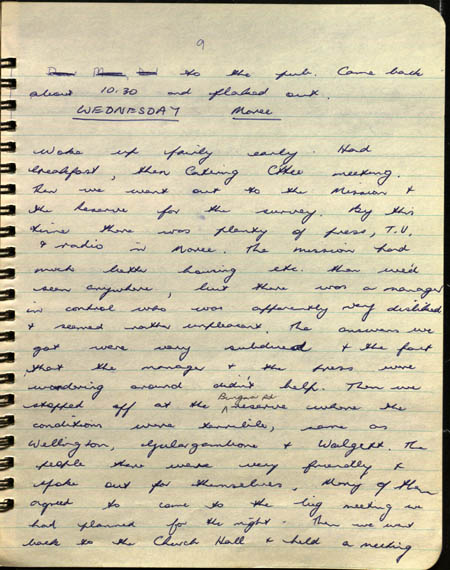
...to the pub. Came back about 10.30 and flaked out.
Wednesday Moree
Woke up fairly early. Had breakfast, then Catering Committee meeting. Then we went out to the Mission and the Reserve for the survey. By this time there was plenty of press, TV, and radio in Moree. The mission had much better housing etc. than we'd seen anywhere, but there was a manager in control who was apparently very disliked and seemed rather unpleasant. The answers we got were very subdued and the fact that the manager and the press were wandering about didn't help. Then we stopped off at the Bingara Rd reserve where the conditions were terrible, same as Wellington, Gulargambone and Walgett. The people there were very friendly and spoke out for themselves. Many of them agreed to come to the big meeting we had planned for the night. Then we went back to the Church Hall and held a meeting...

... to discuss our plans. It was a very heated meeting with a lot of dissensions and disagreements. But finally we worked it out to (1) Have I hr picket outside the Council Chambers protesting against the swimming baths discriminatory clause (2) Go to baths and take 6 aboriginal children in (3) Hold big meeting in the night.
We did the picket, but nobody much came around, and we all boiled, it was very hot. The we went to the swimming pool. The manager refused to let the six aboriginals in and so we held up our posters and signs. After about 25 mins they let the boys in. Then Charlie arrived with a bus load of 21 aboriginal boys and they had to be all let in. We had a good swim and Charlie really talked well to all the white kids whose attitude as rather ambivalent really. After this we took the kids back to the mission.

A little girl with a fantastic voice led the singing and we sang Beatle songs all the way back. The spirit was tremendous. We all got out of the bus and everyone was running around getting their photo taken, and swapping addresses.
We went back to the hall, had tea, and then went off to the Memorial Hall for the public meeting we'd arranged. There were over 200 people there and at first the atmosphere was very hostile, with lots of jeering and interjection.
Jim Spigelman spoke first, about who we were and how we came to be there. Then John Powles, on the survey. Then Charlie. The questions were sometimes antagonistic but there were some very sympathetic ones too. Then a Mr Kelly got up and moved that the clause in the statute books about segregation in the swimming pool be removed. This was seconded by Bob Brown, and accepted 88 votes to 10. We were all thrilled to bits.
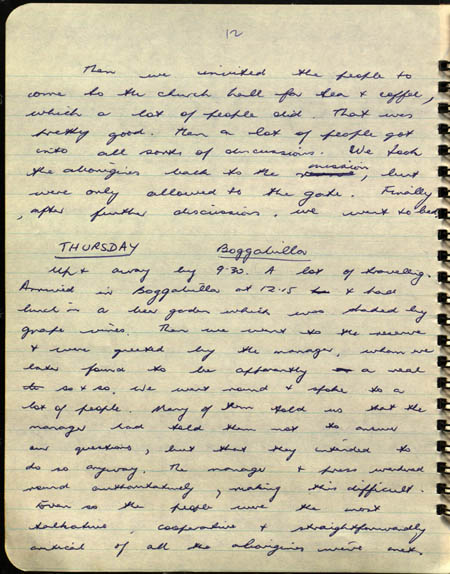
Then we invited the people to come to the church hall for tea and coffee, which lot of people did. That was pretty good. Then a lot of people got into all sorts of discussions. We took the aborigines back to the mission, but were only allowed to the gate. Finally after further discussions, we went to bed.
Thursday Boggabilla
Up and away by 9.30. A lot of travelling. Arrived in Boggabilla at 12.15 and had lunch in a beer garden which was shaded by grape vines. Then we went to the reserve and were greeted by the manager, whom we later found to be apparently a real so and so. We went around and spoke to a lot of people. Many of them told us that the manager had told them not to answer our questions, but they intended to do so anyway. The manager and press wandered round authoritatively, making this difficult. Even so the people were the most talkative, cooperative and straightforwardly critical of all the aborigines we've met.
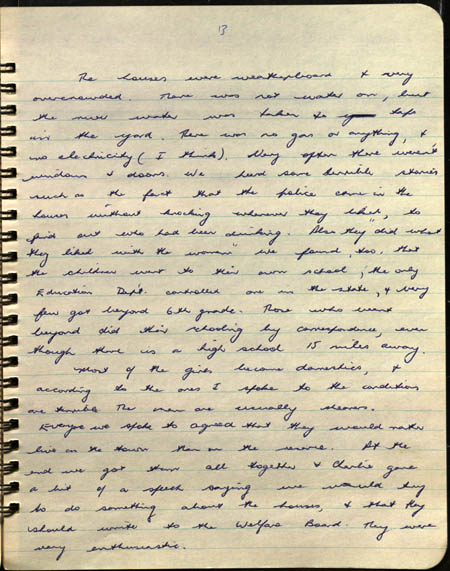
The houses were weatherboard and very overcrowded. There was not water on, but the river water was taken to taps in the yard. There was no gas or anything, and no electricity (I think). Very often there weren't windows and doors. We heard some terrible stories such as the fact that the police came in the houses without knocking whenever they liked, to find out who had been drinking. Also they "did what they liked with the women". We found too that the children went to their own school, the only Education Dept controlled one in the state, and very few got beyond 6th grade. Those who went beyond did their schooling by correspondence, even though there is a high school 15 miles away.
Most of the girls become domestics, and according to the ones I spoke to the conditions are terrible. The men are usually shearers. Everyone we spoke to agreed that they would rather live in the town than on the reserve. At the end we got them all together and Charlie gave a bit of a speech saying we would try to do something about the houses, and that they should write to the Welfare Board. They were very enthusiastic.
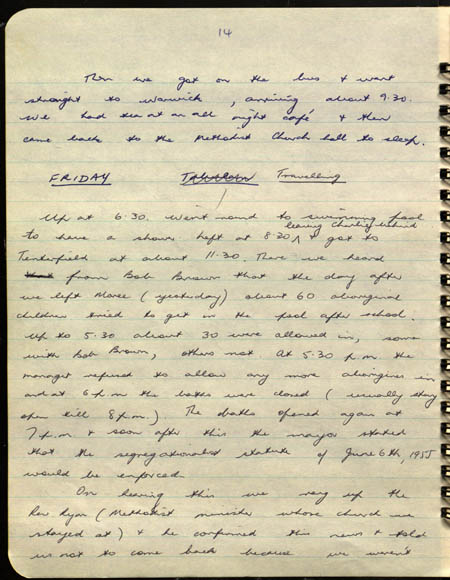
Then we got on the bus and went straight to Warwick, arriving about 9.30. We had tea at an all night cafe and the came back to the Methodist Church hall to sleep.
Friday Travelling
Up at 6.30. Went round to swimming pool to have a shower. Left at 8.30 leaving Charlie behind and got to Tenterfield at about 11.30. There we heard from Bob Brown that they day after we left Moree (yesterday) about 60 aboriginal children tried to get in the pool after school. Up to 5.30 about 30 were allowed in, some with Bob Brown, others not. At 5.30 pm the manager refused to allow any more aborigines in and at 6pm the baths were closed (usually they stay open till 8pm). The baths opened again at 7pm and soon after this the mayor stated that the segregationalist statute of June 6th 1955 would be enforced.
On hearing this we rang up the Rev. Ryan (Methodist minister whose church we stayed at) and he confirmed this news and told us not to come back because we weren't...

...wanted. We also rang Mr Kelly (the man who moved the desegregation motion at the Moree meeting) and he also confirmed the statement. Jim made a press statement, and the press ascertained from the mayor himself that the report was true.
We held a general meeting, the first we'd had without Charlie . We decided, after much heated discussion, to go straight to Inverell, thus leaving out Tabulam. From Inverell where we would stay the night we would contact Charlie and he would arrive at Inverell at 9.30pm on Saturday. From there we would go straight to Moree and take strong action of some kind, such as a 24hr picket or something. The decision was unanimous.
We pretended to the press until the bus got going that we were still going to Tabulam, in case the news got out. Once the bus got going we announced that we were going to Moree. We stopped at Glen Innes for half an hour and got to Inverell at about 6.30 p.m. On the radio we heard that we were still going to Tabulam, so ...

the news had not leaked out yet. Also we rang Charlie, and learned that he had been met at the airport by a flood of pressmen. We read in the news about the poor girls getting, abused, which was only faintly true really. We stayed in the park thing behind the "Twin Swans" motel just out of Inverell. Some of the boys went into town to ring up Charlie, who had apparently been flabbergasted by all the pressmen. He was very enthusiastic about our returning to Moree, and apparently Ted Noffs agreed with him.
Saturday Back to Moree
Woke early. We were all full of burrs from sleeping on the ground. Gerry Mason had had a good night because we all put in to pay for a hotel room for him. On the radio we heard that aboriginal children had been demonstrating outside the Moree baths for the last two afternoons, which was terrific news. All of us are very determined that we are doing the right thing despite the mayor's warning over the radio that our return would cause...
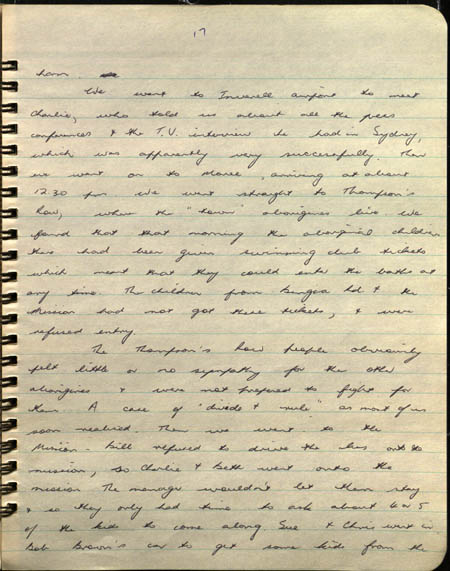
...harm.
We went to Inverell airport to meet Charlie, who told us about all the press conferences and the TV interview he had in Sydney, which was apparently very successfully. Then we went on to Moree, arriving at about 12.30 pm. We went straight to Thompson's Row, where the "town" aborigines live. We found that that morning the aboriginal children there had been given swimming club tickets which meant that they could enter the baths at any time. The children from Bingara Rd and the Mission had not got these tickets, and were refused entry.
The Thompson's Row people obviously felt little or no sympathy for the other aborigines and were not prepared to fight for them. A case of "divide and rule" as most of us soon realised. Then we went to the Mission. Bill refused to drive the bus onto the mission, so Charlie and Beth went onto the mission. The manager wouldn't let them stay and so they only had time to ask about 4 or 5 of the kids to come along. Sue and Chris went in Bob Brown's car to get some kids from the...
